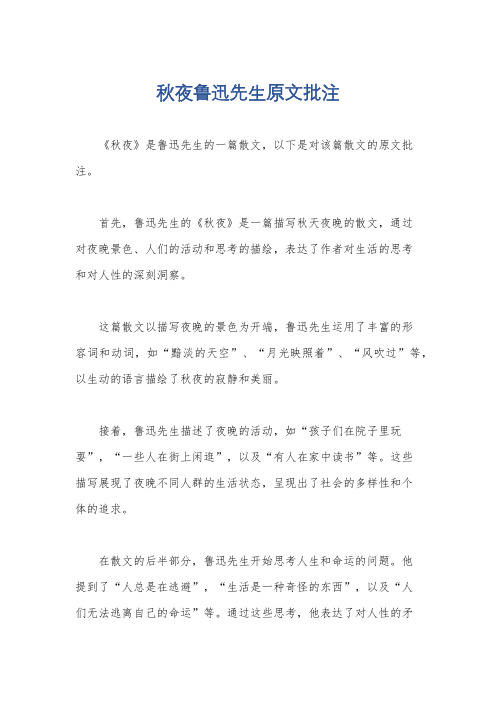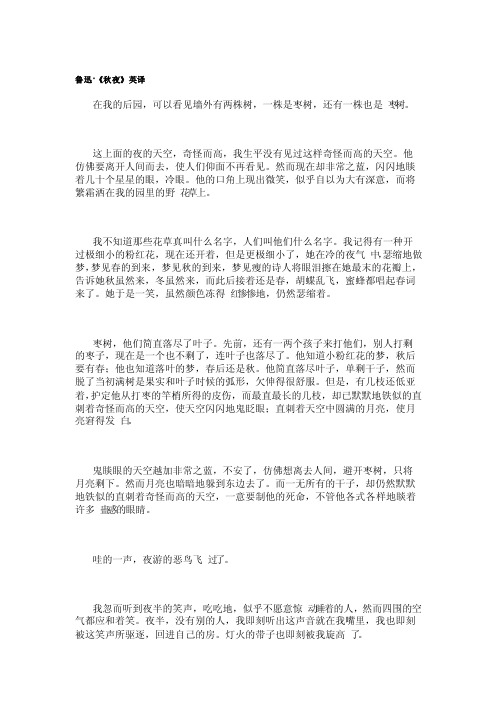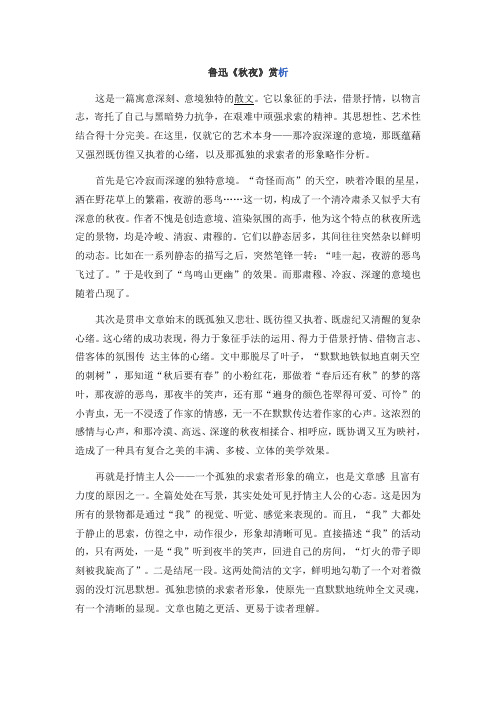鲁迅《秋夜》英译文对比赏析
《秋夜》鉴赏

《秋夜》鉴赏《秋夜》鉴赏过程:1、阅读2、讨论3、明确4、多重解读鲁迅写本文的时候,正是“《新青年》团体散掉了,有的高升,有的退隐,有的前进”的时候,他“又经验了一回同一战阵中的伙伴还是会这么变化”,感到苦闷、孤独,仿佛“在沙漠中走来走去”(《自序》)。
在北洋军阀统治下的北京,笼罩在一片黑暗之中。
但是鲁迅并未消沉下去,而是继续以笔为武器,同黑暗的社会作顽强的斗争。
这是一篇含蓄隽永的散文,通过描写肃杀、寒冷的秋夜中的各种景物,表现了作者当时孤独、苦闷、激愤的心境,体现了作者与恶势力进行不妥协斗争的精神。
文章描写的是秋夜里一些有特征、有象征意义的事物,景物描写背后贯穿的是深沉含蓄的情感线索;在行文上,则以“我”的视点游动为转移。
写后园:“……墙外有两株树,一株是枣树,还有一株也是枣树。
”为什么反复点明枣树?历来有争议。
大概是为了表明枣树在作者心目中的地位,表明作者在各种景物中突出枣树的形象。
另外,作者还有可能是为了表现一点语言的谐趣。
此数语可视为本文文眼,就像“这几天心里颇不宁静”是《荷塘月色》中的文眼一样,因为它们是写“我”的孤愤心境的起点,是理解本文写景意蕴和作者思想感情的关纽。
写夜空:它奇怪而高,非常之蓝,着着星星的冷眼而自以为大有深意,并给大地降下繁霜。
其特点是:高远,冷漠,险恶。
它象征着黑暗势力,或者象征着黑暗社会。
写小粉红花:它是无名花,开得极细小,冻得红惨惨的,可还做着春天的梦。
其特点是:弱小,受害,纯真,盲目乐观。
它象征着社会上心地单纯而善良的受压迫的弱势人群。
写枣树、夜空和月亮:枣树比小粉红花看得、想得更远;它光秃秃的,带着皮伤,但仍不顾一切地直刺着天空和月亮。
其特点是:清醒,沉著,孤独,疾恶如仇,坚强不屈。
它象征着宁愿粉身碎骨也要与黑暗社会斗争到底的斗士。
夜空的形象在这里有所变化,“不安了”,“避开枣树”,暴露了色厉内荏的另一面。
月亮也被枣树刺得“窘得发白”,“也暗暗地躲到东边去了”,原先它像夜空一样嚣张,现在比夜空还要脆弱。
秋夜鲁迅先生原文批注

秋夜鲁迅先生原文批注
《秋夜》是鲁迅先生的一篇散文,以下是对该篇散文的原文批注。
首先,鲁迅先生的《秋夜》是一篇描写秋天夜晚的散文,通过
对夜晚景色、人们的活动和思考的描绘,表达了作者对生活的思考
和对人性的深刻洞察。
这篇散文以描写夜晚的景色为开端,鲁迅先生运用了丰富的形
容词和动词,如“黯淡的天空”、“月光映照着”、“风吹过”等,以生动的语言描绘了秋夜的寂静和美丽。
接着,鲁迅先生描述了夜晚的活动,如“孩子们在院子里玩耍”,“一些人在街上闲逛”,以及“有人在家中读书”等。
这些
描写展现了夜晚不同人群的生活状态,呈现出了社会的多样性和个
体的追求。
在散文的后半部分,鲁迅先生开始思考人生和命运的问题。
他
提到了“人总是在逃避”,“生活是一种奇怪的东西”,以及“人
们无法逃离自己的命运”等。
通过这些思考,他表达了对人性的矛
盾和无奈的感慨。
总的来说,鲁迅先生的《秋夜》是一篇充满思考和感慨的散文。
通过对夜晚景色和人们活动的描写,他展现了社会的多样性和个体
的追求。
同时,他通过对人生和命运的思考,表达了对人性的深刻
洞察和对生活的思考。
这篇散文以其独特的视角和深刻的思考,给
读者带来了对生活和人性的思考和启示。
以上是对鲁迅先生的《秋夜》原文的批注,希望能够满足你的
要求。
鲁迅《秋夜》英译文对比赏析

鲁迅·《秋夜》英译在我的后园,可以看见墙外有两株树,一株是枣树,还有一株也是枣树。
这上面的夜的天空,奇怪而高,我生平没有见过这样奇怪而高的天空。
他仿佛要离开人间而去,使人们仰面不再看见。
然而现在却非常之蓝,闪闪地睒着几十个星星的眼,冷眼。
他的口角上现出微笑,似乎自以为大有深意,而将繁霜洒在我的园里的野花草上。
我不知道那些花草真叫什么名字,人们叫他们什么名字。
我记得有一种开过极细小的粉红花,现在还开着,但是更极细小了,她在冷的夜气中,瑟缩地做梦,梦见春的到来,梦见秋的到来,梦见瘦的诗人将眼泪擦在她最末的花瓣上,告诉她秋虽然来,冬虽然来,而此后接着还是春,胡蝶乱飞,蜜蜂都唱起春词来了。
她于是一笑,虽然颜色冻得红惨惨地,仍然瑟缩着。
枣树,他们简直落尽了叶子。
先前,还有一两个孩子来打他们,别人打剩的枣子,现在是一个也不剩了,连叶子也落尽了。
他知道小粉红花的梦,秋后要有春;他也知道落叶的梦,春后还是秋。
他简直落尽叶子,单剩干子,然而脱了当初满树是果实和叶子时候的弧形,欠伸得很舒服。
但是,有几枝还低亚着,护定他从打枣的竿梢所得的皮伤,而最直最长的几枝,却已默默地铁似的直刺着奇怪而高的天空,使天空闪闪地鬼眨眼;直刺着天空中圆满的月亮,使月亮窘得发白。
鬼睒眼的天空越加非常之蓝,不安了,仿佛想离去人间,避开枣树,只将月亮剩下。
然而月亮也暗暗地躲到东边去了。
而一无所有的干子,却仍然默默地铁似的直刺着奇怪而高的天空,一意要制他的死命,不管他各式各样地睒着许多蛊惑的眼睛。
哇的一声,夜游的恶鸟飞过了。
我忽而听到夜半的笑声,吃吃地,似乎不愿意惊动睡着的人,然而四围的空气都应和着笑。
夜半,没有别的人,我即刻听出这声音就在我嘴里,我也即刻被这笑声所驱逐,回进自己的房。
灯火的带子也即刻被我旋高了。
鲁迅秋夜中+赏析

鲁迅秋夜中+赏析第一篇:鲁迅秋夜中+赏析《秋夜》是鲁迅散文集《野草》中的一篇散文《秋夜》是散文诗集《野草》的第一篇,发表于1924年12月。
作者当时在北京,正和北洋军阀黑暗统治及封建势力进行着韧性的战斗。
枣树是全篇的主要形象,它的主要特征是:“最长最直的几枝(树干),却已默默地铁似的直刺着奇怪而高的天空,使天空闪闪地鬼〖目夹〗眼;直刺着天空中圆满的月亮,使月亮窘的发白”,“一意要制他(指天空)的死命,不管他各式各样的〖目夹〗着许多蛊惑的眼睛”。
这是枣树形象特征的核心。
其次的特征是“欠伸的很舒服”,“有几枝还低亚着,护定他从打枣的竿梢所得的皮伤”。
再次的一个特征是“他知道小粉红花的梦,秋后要有春;他也知道落叶的梦,春后还是秋。
”意蕴枣树(形象)饱经沧桑,坚实挺拔,憎恶黑暗现实,顽强抗击黑暗势力,他善于战斗,也注意在战斗中保护自己,他坚韧不拔,不受反动势力任何蛊惑,(精神)不克厥敌,战则不止,表现出一种顽强抗击黑暗的韧性战斗精神。
枣树就像一个历经战斗洗礼的老战士。
这个形象既是作者对这样的战士的热情歌颂,也是鲁迅自己的人格、精神和战斗豪情的诗意写照。
这就是枣树形象所包含的意蕴。
枣树“知道落叶的梦,春后还是秋”,既反映了鲁迅对斗争黑暗前景的曲折复杂长期性的清醒认识,也流露出他在当时尚未看清革命前途、尚未找到新的战友时的苦闷和孤独感。
2、天空、小粉红花、小青虫形象的各自特征及其象征意蕴。
天空最主要的特征是“将繁霜洒在我的圆里的野花草上”使得人间草木凋零,只剩下极细小的粉红花还开着。
此外,它“奇怪而高”,“仿佛要离开人间而去”,它“闪闪地〖目夹〗着几十个星星的眼,冷眼。
”“口角上现出微笑,似乎自以为大有深意。
”在本篇中,由上面的一些特征可以看出它对人间是不友好的,是居心叵测、不怀好意的。
天空是黑暗暴虐的统治势力的象征,它凶恶狡黠而残忍,但又色厉内荏,十分虚弱,这一形象传达出作者对黑暗暴虐的统治势力的憎恶和愤怒。
秋夜赏析

鲁迅《秋夜》赏析这是一篇寓意深刻、意境独特的散文。
它以象征的手法,借景抒情,以物言志,寄托了自己与黑暗势力抗争,在艰难中顽强求索的精神。
其思想性、艺术性结合得十分完美。
在这里,仅就它的艺术本身——那冷寂深邃的意境,那既蕴藉又强烈既仿徨又执着的心绪,以及那孤独的求索者的形象略作分析。
首先是它冷寂而深邃的独特意境。
“奇怪而高”的天空,映着冷眼的星星,洒在野花草上的繁霜,夜游的恶鸟……这一切,构成了一个清冷肃杀又似乎大有深意的秋夜。
作者不愧是创造意境、渲染氛围的高手,他为这个特点的秋夜所选定的景物,均是冷峻、清寂、肃穆的。
它们以静态居多,其间往往突然杂以鲜明的动态。
比如在一系列静态的描写之后,突然笔锋一转:“哇一起,夜游的恶鸟飞过了。
”于是收到了“鸟鸣山更幽”的效果。
而那肃穆、冷寂、深邃的意境也随着凸现了。
其次是贯串文章始末的既孤独又悲壮、既彷徨又执着、既虚纪又清醒的复杂心绪。
这心绪的成功表现,得力于象征手法的运用、得力于借景抒情、借物言志、借客体的氛围传达主体的心绪。
文中那脱尽了叶子,“默默地铁似地直刺天空的刺树”,那知道“秋后要有春”的小粉红花,那做着“春后还有秋”的梦的落叶,那夜游的恶鸟,那夜半的笑声,还有那“遍身的颜色苍翠得可爱、可怜”的小青虫,无一不浸透了作家的情感,无一不在默默传达着作家的心声。
这浓烈的感情与心声,和那冷漠、高远、深邃的秋夜相揉合、相呼应,既协调又互为映衬,造成了一种具有复合之美的丰满、多棱、立体的美学效果。
再就是抒情主人公——一个孤独的求索者形象的确立,也是文章感且富有力度的原因之一。
全篇处处在写景,其实处处可见抒情主人公的心态。
这是因为所有的景物都是通过“我”的视觉、听觉、感觉来表现的。
而且,“我”大都处于静止的思索,仿徨之中,动作很少,形象却清晰可见。
直接描述“我”的活动的,只有两处,一是“我”听到夜半的笑声,回进自己的房间,“灯火的带子即刻被我旋高了”。
二是结尾一段。
鲁迅《秋夜》赏析

鲁迅《秋夜》背景时代背景:《秋夜》是鲁迅散文集《野草》的第一篇,发表于1924年12月。
当时北京的政治环境正如鲁迅所说:"实在黑暗的可以!"鲁迅在北京与北洋军阀的黑暗统治及封建势力进行着韧性的战斗。
他的内心是矛盾、痛苦又压抑的,但是他具有顽强不倦的战斗精神,决不向黑暗势力低头。
《秋夜》正是作者与旧社会抗争到底的誓言。
但受制于当时恶劣的环境,鲁迅只能采用一种隐晦的象征主义的表现方法,把自己强烈的思想感情藏匿在景物描写之中。
写作特色《秋夜》大量运用了象征手法,创造了广阔而深邃的诗的意境。
作品中创造了天空、枣树、小粉红花、小青虫等一组具有深刻意蕴的象征性形象。
这些形象各具鲜明的特点,都具有特定的象征意义,寄寓着作者特定的情思和理想,表达着作者独特的生活感受。
这些形象不是干巴巴的自然景物的堆积,而是经过了作者主观的改造,以能够唤起读者想象和联想的、具体可感的象征体形式体现出来。
《秋夜》巧妙地将哲理隐藏在充满诗意的抒发中。
鲁迅笔下的天空、月亮、星星、恶鸟、枣树、小粉红花、小青虫等都是自然景物,又都不完全是自然界中的景物本身,而是人格化了的,无不闪烁着思想和哲理的光芒,或激起人们的憎恶,或唤起人们的同情,或启迪人们去思考。
作者对这些具有象征意味形象的抒情,创造了一种隐含哲理思索的诗的意境。
《秋夜》在语言运用上也比较适应象征主义表现手法的需要。
为了使语言更加符合人格化了的自然景物的特征,鲁迅特意选择了许多有动有静、有声有色的语言,能够构成画面,能够产生音响。
读后掩卷,那闪着冷眼、洒满繁霜的夜空;那窘得发白的圆满的月亮;那默默地铁似的直刺着奇怪而高的天空的枣树;那冻得红惨惨的瑟缩着作梦的小粉红花;那撞在玻璃灯罩上丁咚作响的小青虫……都还在眼前活动着,仿佛触手可得。
象征意蕴作品对枣树的赞美,是全篇的核心。
枣树饱经沧桑,它虽然也受着夜空的摧残,但他毫不动摇,他不是靠幻想来支撑自己,而是执着于现实的战斗,"他知道小粉红花的梦,秋后要有春;他也知道落叶的梦,春后还是秋",但它不管环境如何变化,只是"默默地铁似的直刺着奇怪而高的天空”,使天空闪闪地鬼眼,直刺着天空中圆满的月亮,使月亮窘得发白",而且"一意要制他的死命,不管他各式各样地着许多盅惑的眼睛。
《秋夜》译文及赏析

《秋夜》译文及赏析(最新版)编制人:__________________审核人:__________________审批人:__________________编制单位:__________________编制时间:____年____月____日序言下载提示:该文档是本店铺精心编制而成的,希望大家下载后,能够帮助大家解决实际问题。
文档下载后可定制修改,请根据实际需要进行调整和使用,谢谢!并且,本店铺为大家提供各种类型的经典范文,如教案大全、教学资料、作文大全、演讲致辞、祝福语、名言句子、感悟故事、心得体会、总结报告、工作计划、党团资料、条据书信、合同协议、其他范文等等,想了解不同范文格式和写法,敬请关注!Download tips: This document is carefully compiled by this editor.I hope that after you download it, it can help you solve practical problems. The document can be customized and modified after downloading, please adjust and use it according to actual needs, thank you!In addition, this shop provides you with various types of classic sample essays, such as teaching plans, teaching materials, essays, speeches, blessings, famous quotes, sentences, insights, experiences, summary reports, work plans, party and group information, and rules Letters, contract agreements, other sample essays, etc. If you want to know the format and writing of different sample essays, stay tuned!《秋夜》译文及赏析《秋夜》译文及赏析1《秋夜》宋代:朱淑真夜久无眠秋气清,烛花频剪欲三更。
《秋夜》鲁迅赏析解析

国民党 1949年逃往台湾后,则对鲁迅著作采取查、 封、禁、堵的政策。 1933年6月民权保障同盟执行委员杨杏佛被杀,鲁 迅的生命安全几度受到严重威胁。与此同时,国民 党特务机构a加强了对鲁迅的监视。 国民党统治集团充分施展了他们的反革命两手策略: 一方面加紧对鲁迅进行监视、迫害、打击,通缉令 直到鲁迅去世时仍未解除;另一方面他们也始终存 有幻想,抓住一切可利用的机会,通过多种渠道妄 图拉鲁迅转向。 鲁迅临终说:1.坚拒世人的物质恩惠:不得因为丧 事,收受任何人的一文钱。2.让他们仇恨去,我也 一个都不宽恕.这是一个永不衰弱的灵魂它是作者心灵的对应物, 寄寓着精神界战士的品格。敌视枣树的夜空,其威 枚摧折着一切生命的存在,要使秋夜成为一个生命 荒芜的冷酷世界。在这世界里满是蜷伏着怯弱的生 命,惟有枣树是敢于与夜空相搏的孤独的战士。他 不畏惧造物主的权威,尽管“落尽叶子,单剩干 子,”仍然抖擞精神向黑暗进击。枣树饱经历史的 风霜雨雪,有着十分清醒的现实主义精神。
1906年7月6日(光绪三十二年农历丙午六月初六)鲁迅在日本 被母亲骗回老家完婚。就在娶亲轿子刚一落地的时候,从轿子 里面伸出了一只中等大小的脚,这只脚试探着踩向地面,然而 由于轿子高,一时没有踩到地面,可绣花鞋却掉了下来,在这 只鞋的里面却露出了一只裹得很小的小脚。原来,这位新娘就 是朱安,她比鲁迅大三岁,她听说新郎喜欢大脚,因此穿了双 大鞋,里面塞了很多棉花,想讨新郎喜欢。可当场就露馅了, 这似乎预示着她一生的不幸。 朱安虽是鲁迅的老婆,但却有名无实,她为鲁迅空守了41年, 直到1936年鲁迅去世也没给朱安留下有个自己孩子的希望。她 是一个典型封建婚姻包办的牺牲品。朱安临终前,泪流满面地 说:“希望死后葬到大先生之旁,”她想念许广平和海婴。她 面对自己的情敌和情敌的孩子竟然毫无怨恨之意。 1947年6月29日,朱安孤独地去世了,身边没有一个人。她在这 个世界上生活了69个春秋,孤独地度过了四十多个漫长的岁月。
- 1、下载文档前请自行甄别文档内容的完整性,平台不提供额外的编辑、内容补充、找答案等附加服务。
- 2、"仅部分预览"的文档,不可在线预览部分如存在完整性等问题,可反馈申请退款(可完整预览的文档不适用该条件!)。
- 3、如文档侵犯您的权益,请联系客服反馈,我们会尽快为您处理(人工客服工作时间:9:00-18:30)。
鲁迅·《秋夜》英译在我的后园,可以看见墙外有两株树,一株是枣树,还有一株也是枣树。
这上面的夜的天空,奇怪而高,我生平没有见过这样奇怪而高的天空。
他仿佛要离开人间而去,使人们仰面不再看见。
然而现在却非常之蓝,闪闪地睒着几十个星星的眼,冷眼。
他的口角上现出微笑,似乎自以为大有深意,而将繁霜洒在我的园里的野花草上。
我不知道那些花草真叫什么名字,人们叫他们什么名字。
我记得有一种开过极细小的粉红花,现在还开着,但是更极细小了,她在冷的夜气中,瑟缩地做梦,梦见春的到来,梦见秋的到来,梦见瘦的诗人将眼泪擦在她最末的花瓣上,告诉她秋虽然来,冬虽然来,而此后接着还是春,胡蝶乱飞,蜜蜂都唱起春词来了。
她于是一笑,虽然颜色冻得红惨惨地,仍然瑟缩着。
枣树,他们简直落尽了叶子。
先前,还有一两个孩子来打他们,别人打剩的枣子,现在是一个也不剩了,连叶子也落尽了。
他知道小粉红花的梦,秋后要有春;他也知道落叶的梦,春后还是秋。
他简直落尽叶子,单剩干子,然而脱了当初满树是果实和叶子时候的弧形,欠伸得很舒服。
但是,有几枝还低亚着,护定他从打枣的竿梢所得的皮伤,而最直最长的几枝,却已默默地铁似的直刺着奇怪而高的天空,使天空闪闪地鬼眨眼;直刺着天空中圆满的月亮,使月亮窘得发白。
鬼睒眼的天空越加非常之蓝,不安了,仿佛想离去人间,避开枣树,只将月亮剩下。
然而月亮也暗暗地躲到东边去了。
而一无所有的干子,却仍然默默地铁似的直刺着奇怪而高的天空,一意要制他的死命,不管他各式各样地睒着许多蛊惑的眼睛。
哇的一声,夜游的恶鸟飞过了。
我忽而听到夜半的笑声,吃吃地,似乎不愿意惊动睡着的人,然而四围的空气都应和着笑。
夜半,没有别的人,我即刻听出这声音就在我嘴里,我也即刻被这笑声所驱逐,回进自己的房。
灯火的带子也即刻被我旋高了。
后窗的玻璃上丁丁地响,还有许多小飞虫乱撞。
不多久,几个进来了,许是从窗纸的破孔进来的。
他们一进来,又在玻璃的灯罩上撞得丁丁地响。
一个从上面撞进去了,他于是遇到火,而且我以为这火是真的。
两三个却休息在灯的纸罩上喘气。
那罩是昨晚新换的罩,雪白的纸,折出波浪纹的叠痕,一角还画出一枝猩红色的栀子。
猩红的栀子开花时,枣树又要做小粉红花的梦,青葱地弯成弧形了……我又听到夜半的笑声;我赶紧砍断我的心绪,看那老在白纸罩上的小青虫,头大尾小,向日葵子似的,只有半粒小麦那么大,遍身的颜色苍翠得可爱,可怜。
我打一个呵欠,点起一支纸烟,喷出烟来,对着灯默默地敬奠这些苍翠精致的英雄们。
一九二四年九月十五日。
Autumn NightLu XunBehind the wall of my backyard you can see two trees: one is a date tree, the other is also a date tree.The night sky above them is strange and high. I have never seen such a strange, high sky. It seems to want to leave this world of men, so that when folk look up they won’t be able to see it. For the moment, though, it is singularly blue; and its scores of starry eyes are blinking coldly. A faint smile plays round its lips, a smile which it seems to think highly significant; and it dusts the wild plants in my courtyard with heavy frost.I have no idea what these plants are called, what names they are commonly known by. One of them, I remember, has minute pink flowers, and its flowers are still lingering on, although more minute than ever. Shivering in the cold night air they dream of the coming of spring, of the coming of autumn, of the lean poet wiping his tears upon their last petals, who tells them autumn will come and winter will come, yet spring will follow when butterflies flit to and fro, and all the bees start humming songs of spring. Then the little pink flowers smile, though they have turned a mournful crimson with cold and are shivering still.As for the date trees, they have lost absolutely all their leaves. Before, one or two boys still came to beat down the dates other people had missed. But now not one date is left, and the trees have lost all their leaves as well. They know the little pink flowers’ dream o f spring after autumn; and they know the dream of the fallen leaves of autumn after spring. They may have lost all their leaves and have only their branches left; but these, no longer weighed down with fruit and foliage, are stretching themselves luxuriously. A few boughs, though, are still drooping, nursing the wounds made in their bark by the sticks which beat down the dates; while, rigid as iron, the straightest and longest boughs silently pierce the strange, high sky, making it blink in dismay. They pierce even the full moon in the sky, making it pale and ill at ease.Blinking in dismay, the sky becomes bluer and bluer, more and more uneasy, as if eager to escape from the world of men and avoid the date trees, leaving the moon behind. But the moon, too, is hiding itself in the east; while, silent still and as rigid as iron, the bare boughs pierce the strange, high sky, resolved to inflict on it a mortal wound, no matter in how many ways it winks all its bewitching eyes.With a shriek, a fierce night-bird passes.All of a sudden, I hear midnight laughter. The sound is muffled, as if not to wake those who sleep; yet all around the air resounds to this laughter. Midnight, and no one else is by. At once I realize it is I who am laughing, and at once I am driven by this laughter back to my room. At once I turn up the wick of my paraffin lamp.A pit-a-pat sounds from the glass of the back window, where swarms of insects are recklessly dashing themselves against the pane. Presently some get in, no doubt through a hole in thewindow paper. Once in, they set up another pit-a-pat by dashing themselves against the chimney of the lamp. One hurls itself into the chimney from the top, falling into the flame, and I fancy the flame is real. On the paper shade two or three others rest, panting. The shade is a new one since last night. Its snow white paper is pleated in wave-like folds, and painted in one corner is a spray of blood-red gardenias.When the blood-red gardenias blossom, the date trees, weighed down with bright foliage, will dream once more the dream of the little pink flowers and I shall hear the midnight laughter again.I hastily break off this train of thought to look at the small green insects still on the paper. Like sunflower seeds with their large heads and small tails, they are only half the size of a grain of wheat, the whole of them an adorable, pathetic green.I yawn, light a cigarette, and puff out the smoke, paying silent homage before the lamp to these green and exquisite heroes.September 15, 1924.(杨宪益、戴乃迭译)Autumn NightLu XunThrough the window I can see two trees in my backyard. The one is a date tree, the other is also a date tree.The night sky above is a strange and distant. Never in my life have I seen such a strange and distant sky. He seems intent on forsaking the world and staying out of people’s sight. But now he is winking—with eyes of a few dozen stars, utterly blue, and cold. A smile hovers around his mouth, seeming to him to be very profound, and thereupon he begins to spread frost on the wildflowers and wild grass in my courtyard.I do not know the names of these flowers and grasses, or what people call them. I remember a plant that put forth a tiny flower—the flower is still in bloom, but she is even tiner, trembling in the cold, dreaming. She dreams of the coming of spring, of autumn, of a skinny poet wiping his tears on her last petal, telling her that autumn may come, winter may come, but eventually spring will come, when butterflies will fly gaily about, and the bees will sing their spring song. Thereupon she smiles, although she has turned red in the piercing cold and remains curled up.The date trees have shed all their leaves. Some time ago, a boy or two still came to beat them for the dates that others had left behind. Now, not a single one is left; even the leaves have all fallen. The date tree understands the dream of the tiny pink flower, that after autumn spring will come; he also knows the dream of the fallen leaves, that after spring there is still autumn.He has shed all his foliage, leaving only the trunk; he is relieved from bending under his load of leaves and fruit, and now enjoys stretching himself. But a few boughs are still hanging down, nursing the wounds caused by the poles that struck him for his dates, while the longest and straightest of his boughs are like iron, silently piercing the strange and distant sky, making him wink his wicked eyes; piercing the full moon in the sky, making her go pale with embarrassment.The wickedly winking sky turns an even deeper, perturbed blue. He seems intent on escaping from men, on avoiding the date tree, leaving only the moon behind. But the moon has secretly hid herself in the east. Only the naked trunk is still like iron, silently piercing the strange and distant sky, determined to pierce it to death, regardless of how and how often he winks his seductive eyes.With a sharp shriek, a vicious bird of the night flies past.I suddenly hear a slight tittering in the middle of the night, so soft that it seems not to want to awaken those who are asleep, though the titter echoes across the surroundings air. In the dead of night, there is no one about. I instantly recognize that this laughter is coming from my own mouth. Put to flight by the sound, I go back into my room and immediately raise the wick of my lamp.The glass pane of the back window rattles; many insects are still blindly battering against it. Shortly afterward, a few squeeze in, probably through the holes in the paper covering. Once inside, they knock against the glass lampshade, making yet more rattling sounds. One plunges in from above, and runs into the flame. It is a real flame, I think. But two or three rest panting on the paper lampshade. The lampshade was replaced only last night, its snow-white paper folded in a wavelike pattern, with a sprig of scarlet jasmine painted in one corner.When the scarlet jasmine blossoms, the date tree will again dream the dream of the tiny pink flower; it will grow lushly and bend in an arc. I hear again the midnight laughter, and immediately cut the train of my thought. I look at these little insects still resting on the snow-white paper—their heads big and tails small, like sunflower seeds, only half the size of a grain of wheat. How lovely and pitiable they are in their emerald hue.I yawn, and light a cigarette, puffing out the smoke. I stare at the lamp and pay silent tribute to these dainty heroes in emerald green.(Ng Mau-sang 译)。
